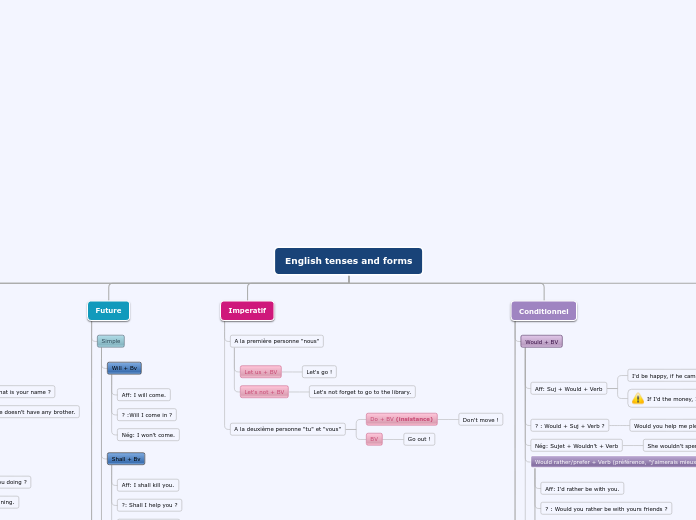by Marilou Salauze 4 years ago
284
Organigramme en Arbre
Understanding English tenses and forms is essential for mastering the language. The passive voice is constructed using "be" plus the past participle, and it changes only with the verb "

by Marilou Salauze 4 years ago
284

More like this
Sujet secondaire
If I had known, I would have told my parents ( Si j'avais su, je l'aurais dit à mes parents)
I couldn't do a dessert.
Could you answer me ?
You could clean your bedroom.
We shouldn't close the windows.
Should I bring my bag ?
You should talk to him.
Nég: Suj + had better + not + Bv
You had better not tell them.
? : Had + Suj + better + Bv ?
Had I better stay or go home ?
Aff: Suj + had better + Bv
You'd better go home.
Pour compléter la comparaison, on emploie "than" et surtout pas "that": We would rather resign than work with you.(démissionner)
Nég: I'd rather not go.
? : Would you rather be with yours friends ?
Aff: I'd rather be with you.
She wouldn't spend her holidays pictures (habitude passée)
Would you help me please ? (volonté/demande polie)
If I'd the money, I'd buy a car ( If I had..., I would...)
I'd be happy, if he came (condition)
Go out !
Don't move !
Let's not forget to go to the library.
Let's go !
Aff: I'm seeing Jake tonight.
Nég:
?:
Aff: It's going to rain.
Nég: I shan't work.
?: Shall I help you ?
Aff: I shall kill you.
Nég: I won't come.
? :Will I come in ?
Aff: I will come.
She isn't running.
What are you doing ?
I'm working.
She doesn't have any brother.
What is your name ?
I have a car.
Nég: I had not been watching.
?: Had I been watching ? (How long)
Aff: I had been watching.
Nég: He had not worked.
?:Had he worked ?
Aff: He had worked.
Nég:I wasn't playing.
?: Was I playing ?
Aff:I was playing ( when you phoned).
Action de 2° plan (imparfait en Fr.)
Nég: I didn't live in London.
?: Wh-/ Did I live in london ?
Aff: I lived in London.
Nég : I haven't been living here.
? : Have they been living here ?
Aff: I have been working since 1999.
Nég: Suj + have/has + not + part.passé
They haven't been there.
? : Have/has + Suj + Part. passé
Have they been there ?
Aff: Suj + have/has + part. passé
They have worked in the USA.